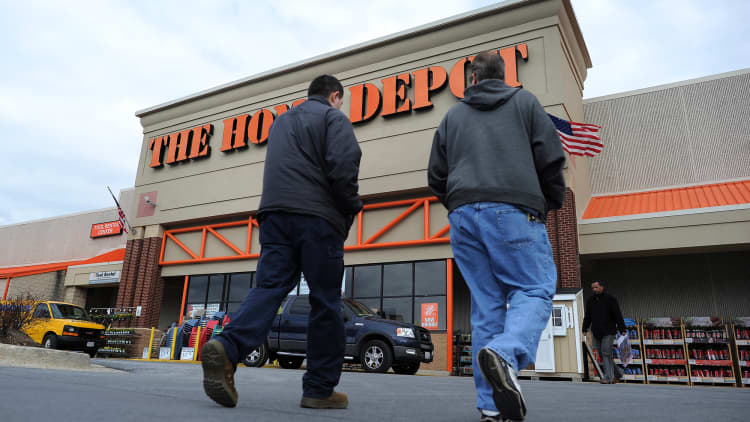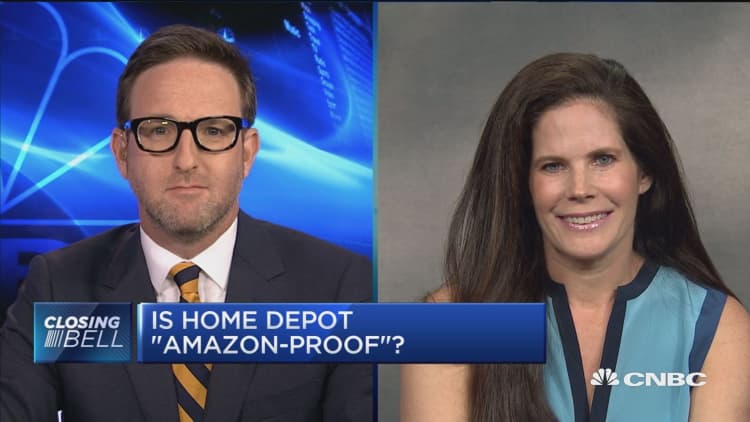
Home Depot is down more than 3 percent despite a stellar earnings report that posted its highest quarterly sales in the company's history. What's going on?
Simply put, continuing fears of the "Amazonification" of retail is hitting the sector hard today, and Home Depot—long considered immune from the Amazon effect—is getting swept up in the worries.
"The Amazon spectre is everywhere in retail," Rob Plaza, retail analyst at Key Private Bank said on CNBC this morning.
Stacey Widlitz with SW Retail Advisors, also appeared on CNBC noting that Amazon "is becoming the new specialty retailer."
But wait a minute—isn't Home Depot supposed to be relatively "safe" from Amazon? Alan Rifkin from BTIG said a few weeks ago that he thought the agreement to sell Kenmore (Sears) appliances through Amazon were "overblown" and that Home Depot had a significantly more robust product lineup than Amazon.
He told me Tuesday he still thinks the concerns are overblown, noting that Kenmore's share has eroded from 30 percent to 10 percent in recent years as Sears share has eroded to 23 percent today.
And back in July CFRA analyst Efraim Levy said, "[B]y the nature of its business, we consider HD to be Amazon-resistant, notably via customer assistance and rising focus on professional customers." Levy reiterated his buy opinion on Home Depot Tuesday, noting that "many of HD's products and its services are not offered by Amazon."
And that's been the tune of most analysts: Home Depot has clear advantages with the Do-It-Yourself (DIY) and professional contracting crowd that is the core of its buyers.
Still, that confidence is eroding somewhat. Widlitz noted that auto parts were also considered "safe" from Amazon not so long ago, and are no longer considered so: "We have to ask the question with Home Depot, particularly as Kenmore is now selling appliances online that are now smart appliances, is this sector safe as well?"
Is Amazon the only issue for Home Depot today? No. Widlitz noted that despite the stellar earnings report, 'HD' does have a high multiple, and gross margins may have plateaued.
Joe Feldman, assistant director of research at retail analyst firm Telsey Advisory Group, told me that he remains bullish on Home Depot but acknowledged that investors are incrementally more concerned about the threat of share loss to Amazon, especially in consumable areas (batteries, light bulbs) as well as disruption in appliances following Amazon's deal with Sears to sell Kenmore and leverage Sears' appliance shipping infrastructure.
He added an additional issue: the longevity of the housing and remodel market. "That question came up on the earnings call today," he told me. "We believe the housing market is not done given the aged housing stock and younger buyers finally coming into the market. However, it's likely that the growth may slow in the next couple of years. As such, some investors have begun to reduce their exposure to Home Depot."
Still, it's Amazon that is the big mover of the retail sector. Indeed, Amazon is a pervasive presence in the conference call for many retailers this quarter. Dick's Sporting Goods CEO Ed Stack, when asked this morning about what was prompting recent "price promotions" (i.e. price cuts) acknowledged that they would have to "wait and see" about the impact of Nike's proposed deal to distribute through Amazon (Nike is a big customer of Dick's). He then went on to say: "I think the pricing is from additional significantly increased distribution and everybody fighting for their share of what now is the same size market but with more competitors in there."
That sums it up perfectly: "Everybody fighting for their share of what now is the same size market but with more competitors in there." And no competitor is bigger than Amazon.
Also not helping the narrative is the poor showing from Advance Auto Parts, which after reporting flat same-store sales for its second quarter said full year comparable sales would drop between 1% and 3% (well below expectations for 0.5% decline).
The poor showing from those two retailers is helping to drop the entire retail sector, with most names in the sector down at least three percent.
Bottom line: after rallying briefly in July (the main Retail ETF, the XRT, rallied nearly 10 percent off its 52-week low in early July) vast swaths of retailers are again at 52-week lows today, including JC Penney, Buckle, Bed Bath & Beyond, Mattel, L Brands, Under Armour, Penske Automotive, Hibbert Sports, Cato, Express, Francesca's Holdings, DSW, and even retail REITS like Tanger Factory Outlets.
So is Amazon destined to take over the world? Not so fast. Efraim Levy from CFRA has heard this before. "At some point a long time ago, Wal-Mart was projected to have a growth rate that would have it take over the entire U.S. economy."
That didn't happen because there was a saturation point, which he believes will be reached with Amazon as well.
WATCH: Buy or hold Home Depot?



